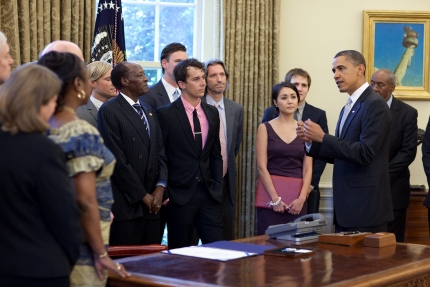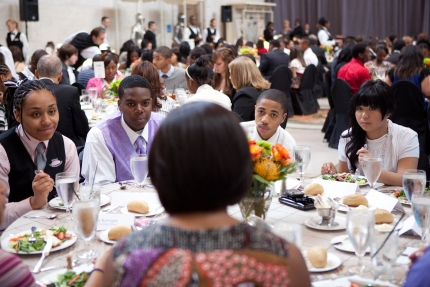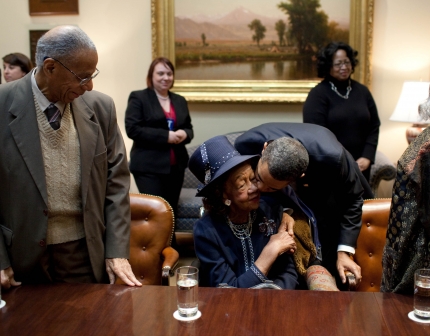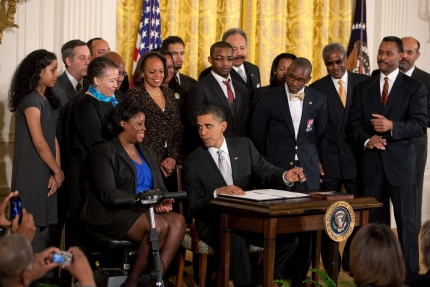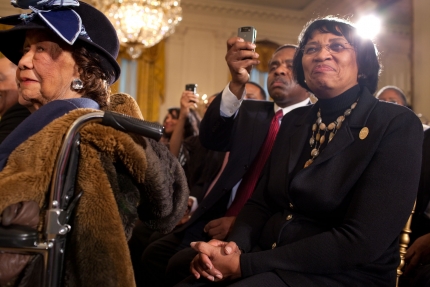Blog Posts Related to the African American Community
A Future of Greater Security and Hope for the People of Central Africa
Posted by on June 1, 2010 at 4:40 PM ESTLast week, the President signed into law the Lord's Resistance Army Disarmament and Northern Uganda Recovery Act of 2009. The legislation crystallizes the commitment of the United States to help bring an end to the brutality and destruction that have been a hallmark of the Lord's Resistance Army (LRA) across several countries for two decades, and to pursue a future of greater security and hope for the people of central Africa.
The Bill reiterates U.S. policy and our commitment to work toward a comprehensive and lasting resolution to the conflict in northern Uganda and other affected areas, including northeastern Democratic Republic of Congo, southern Sudan, and the Central African Republic.
Members of the administration, Congress, and the advocacy and non-governmental organizations community attended the bill signing, including Michael Poffenberger, Executive Director at Resolve Uganda, George Rupp, President of the International Rescue Committee, Linda Poteat with InterAction, Mark Schneider, President of the International Crisis Group, John Prendergast with the Enough Project, Ben Keesey, Executive Director of Invisible Children, Ugandan Ambassador, Perezi K. Kamunanwire, Democratic Republic of Congo Ambassador, Faida M. Mitifu, James Michel with USAID, and Johnnie Carson, Assistant Secretary of State for African Affairs.
The President commended the work of Members of Congress, his administration, advocacy organizations, non-governmental organizations, faith-based groups, humanitarian actors, and the hundreds of thousands of Americans who have mobilized to respond to this crisis. As the President stated, through their hard work, their reporting via websites, blogs, and video postcards, the plight of the children has been made visible to us all.
Karen Richardson is the Associate Director for International Affairs
Learn more about"Our Next Chapter"
Posted by on May 27, 2010 at 4:45 PM ESTYesterday Mrs. Obama took the White House youth leadership and mentoring efforts on the road to Detroit, Michigan. The First Lady’s visit, in partnership with Michigan’s First Gentleman Daniel Mulhern, was designed to engage, encourage, and inspire the city’s young people. Leaders from across the country came along to encourage kids to dream big – mentors included: Governor Granholm; Cathie Black, CEO of Hearst Magazines; Susan Taylor, Editor-in-Chief Emeritus, Essence Magazine and Founder, National CARES Mentoring Movement; Spike Lee, Actor and Director; and Magic Johnson, Basketball Player, to name a few.
In her remarks at Wayne State University, Mrs. Obama discussed the potential of the city's youth:
So our next chapter –- Detroit’s next chapter, Michigan’s next chapter, America’s next chapter –- is waiting to be written.
And it will be written by each and every one of you, because your future, your city’s future, this country’s future will look exactly like what each of you wants it to look like. And that’s what I believe. And that’s why I am here. Young people, I am asking you to embrace that responsibility to be our future.
Later that day, at a mentoring luncheon, the First Lady emphasized the importance of hardwork and support:
What we all know in our lives and through our experiences is that there’s no magic dust that is sprinkled on us that gives us success. There’s no magic to this. There are no shortcuts, there are no quick fixes. None of us was born with the knowledge that we have today, the skills or the talents that we have today. Some, maybe. You’ve got your special people that were just born crazy talented or crazy smart, but it wasn’t me, or the President, for that matter. All these folks here developed those things through hard work.
Governor Granholm wasn’t born knowing how to run a state; probably never thought she’d be doing it. Magic Johnson didn’t know how to always -- did you always know how to dribble? (Laughter.) Maybe you did. Maybe you were one of the ones. But you didn’t always know how to run your own business, right? So, Susan Taylor’s magazine didn’t just publish itself -- Essence, one of my favorites. These achievements took effort and struggle, late nights and long hours. And all these folks practiced and practiced, and then practiced a little more, to get those promotions, to win those elections, and to hit those notes just right.
When people doubted them, or told them they couldn’t do something, they worked a little harder. When they were scared or worried -- and let me tell you, we all have been worried that we just wouldn’t measure up -- they all found a way to keep going. When they fell short or failed -- and failure is a part of success, it’s a necessary part of success -- they didn’t let that defeat them. They let it teach them.
And all along, they found people in their lives to guide them: parents, and grandparents, teachers, coaches, friends who believed in them, who encouraged them and refused to give up on them even when they wanted to give up on themselves.
To have a more concrete impact on local students, the First Lady launched the White House leadership and mentoring initiative in the fall and visited Denver, Colorado in an effort to take the message nationwide. The idea isn’t just to create a once-in-a-lifetime opportunity for just a few, but to encourage more adults to step up, volunteer their time, and make mentoring a lifelong habit.
"The Godmother of the Civil Rights Movement"
Posted by on April 20, 2010 at 3:31 PM ESTThe President joined the rest of the nation in mourning Dorothy Height:
Michelle and I were deeply saddened to hear about the passing of Dorothy Height - the godmother of the Civil Rights Movement and a hero to so many Americans. Ever since she was denied entrance to college because the incoming class had already met its quota of two African American women, Dr. Height devoted her life to those struggling for equality. She led the National Council of Negro Women for 40 years, and served as the only woman at the highest level of the Civil Rights Movement - witnessing every march and milestone along the way. And even in the final weeks of her life – a time when anyone else would have enjoyed their well-earned rest – Dr. Height continued her fight to make our nation a more open and inclusive place for people of every race, gender, background and faith. Michelle and I offer our condolences to all those who knew and loved Dr. Height – and all those whose lives she touched.
The President welcomed Dorothy Height to the Roosevelt Room of the White House for a meeting on Martin Luther King Jr. Day this year:
Learn more about Civil RightsWhat Americans Deserve
Posted by on March 10, 2010 at 7:51 PM ESTToday I had the honor of addressing BET’s first ever “Leading Women Summit” in Washington, DC. The Summit brought together artists, community activists, media representatives and professional women from across the country to work on finding solutions to some of the most pressing problems facing the African American community. I welcomed the opportunity to participate and offer my perspective on the health care crisis in our country, which, according to almost every available statistic, disproportionately affects Women of Color.
For instance, consider the following facts:
- Nearly one in five African Americans (19%) are without health care insurance.
- African Americans in general spend a higher percentage of their income on health care costs compared to their white counterparts (16.5% vs. 12.2%).
- African Americans also tend to live in areas where there are fewer hospitals or where quality care cannot be obtained.
- African Americans suffer from higher percentages of chronic diseases, such as heart disease, kidney disease and diabetes, which are perpetuated by a lack of access to quality care. Currently, 48% of African American adults suffer from a chronic disease compared to 39% of the general population.
With this in mind, my talk focused on President Obama’s unwavering commitment to reforming health insurance. He is determined to give Americans, not government or insurers, more control over their care. He has kept fighting against insurance companies that discriminate against people with pre-existing conditions. He has kept fighting to reduce the costs of health care for families, businesses and government. He has kept fighting. He has kept fighting for people who are uninsured and small businesses to give them the same coverage as Members of Congress. And now it is time for an up-or-down vote in Congress, because that’s what the people deserve -- people like Leslie Banks and Natoma Canfield.
The President met Leslie at a recent event in Philadelphia after she had written him a letter describing her frustrations with her insurance. Leslie is a self-employed, African-American single mother, whose daughter is a sophomore in college at Temple University. Leslie has type 2 diabetes. She can no longer afford her coverage after the insurer recently notified her of a 100% across the board rate hike and told her that the only way to stay at her previous rate would mean increasing her deductible from $500 to $5,000. Leslie is not available for coverage through her HMO because of her pre-existing condition.
Leslie’s story is not that different from the one I told about Natoma Canfield, who also wrote the President about an incredible increase in her rates, which forced her to drop her coverage. President Obama read the letter at a meeting of insurance industry leaders to show them why he continues to push for reform. Since then, Natoma has been hospitalized with a serious blood disorder and she has no health insurance.
As I related these stories, I couldn’t help but notice a lot of head-nodding in the audience. While nobody at today’s Summit knew Leslie or Natoma, the reality is we all know somebody whose life has been touched by the worst practices of the health insurance industry. That’s why it’s so important that we all work together to tackle this problem for the African American community and for all communities across America.
Valerie Jarrett is Senior Advisor and Assistant to the President for Intergovernmental Affairs and Public Engagement
Learn more about Health CareRecognizing What Historically Black Colleges and Universities Mean to America
Posted by on February 28, 2010 at 10:53 AM ESTAs I stood watching the Virginia State University drum-line perform in the White House this week (likely the first time an HBCU drum-line has ever performed at the White House), I was reminded of how far we have come as a nation and hopeful about where we are heading. The nation’s Historically Black Colleges and Universities have served our nation since 1837. They educated freed slaves, giving them the priceless gift of a mind filled with world’s possibilities. Today, this noble goal of our HBCUs continues as they unveil for their students the world of possibilities for themselves, their communities and our nation.
Guests attending this White House event left with a glow not unlike that of January 20, 2009, but they also left with a resolve to do the work that will be necessary to ensure all students have access to a high quality education and armed with the tools they need to reach for the American Dream.
When the President reflected on some of the legends that have matriculated through HBCU's - Thurgood Marshall, Dr. Martin Luther King, WEB Dubois -I thought about how important and critically necessary these institutions have been to the fabric of our nation. I was reminded of the tremendous legacy of HBCUs and that when we invest in our young people at these schools we are preparing the way for the next King, Marshall, and Dubois.
President Obama has demonstrated his commitment to these institutions not just with this event, but also through his budget. The 2011 budget calls for $98 million in new money for HBCUs, including a commitment of $850 million over ten years. These are resources the schools can use however they see fit to build their capacity to deliver a quality education to their students. For the students, this year’s budget calls for an increase in the Pell Grant program, raising it to $5,710 annually. More than 50 percent of the students attending HBCUs qualify for Pell Grants and other forms of support. This is important because, as President Obama said, one in two students at HBCUs are the first in their family to attend college, and HBCUs continue to educate many students who often times would not be able to go to college for financial reasons.
The HBCU presidents and other guests present nodded in agreement as the President talked about the need to increase access and completion at HBCUs and the critical role they play. President Obama believes we must continue investing and supporting HBCUs as part of meeting his mission to develop a world-class education system in America. This is not just for the benefit of African Americans, but as we work to compete with our neighbors around this globe, it is to the benefit of all Americans.
Often in Washington we get mired in partisan debate and lose track of what's really important. Education. Access to opportunity. A fair and living wage. These are things that matter and can make a difference in the lives of people no matter who they are, what they look like or where they are from. We were reminded of these truly American values this week, and for that I am eternally grateful. Now let's get to work!
Viewing this video requires Adobe Flash Player 8 or higher. Download the free player.William Jawando is a Deputy Associate Director of the Office of Public Engagement
Learn more about Civil Rights, Education
- &lsaquo previous
- …
- 44
- 45
- 46
- 47
- 48
- 49
- 50
- 51
- 52
- …
- next &rsaquo
